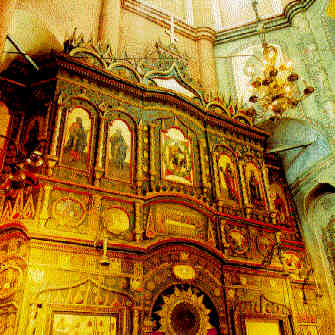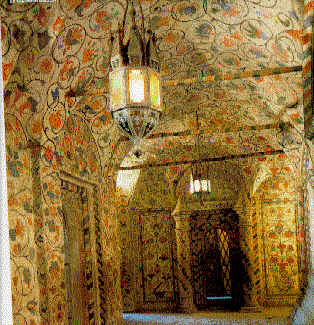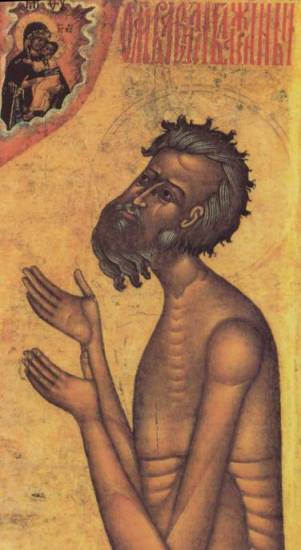| What is the Orthodox Church and what does it have to offer the world? What does the Orthodox Church have to offer the world?The world today is filled with hardships and turmoil. Many cry out for peace, hope, love and understanding. The message of the Ortodox Church to the world today is precisely this: a message of hope, understanding, peace and love. It is the message with a living encounter with God, and renewed relationship with Him and all His creation. The Orthodox believe that the world was created in a state of peace, harmony, simplicity and love. The first creatures, man and woman, were created "in the image and likeness of God." (Gen 1). As such they were endowed with a perfect sense of harmony and love, well being and contentment, and the ability to openly enjoy a direct relationship with God Himself, the Ultimate Being, Beyond Being, the Glorious, Awesome, Compassionate and Merciful One. It was this participation in the Glory that surrounds the Eternal God that kept man and all creation in a state of harmony, peace and love. |

|
| But then something happened. The creature chose to deliberately
violate that relationship by cheating. When mankind "tried to get away
with something" he found that he could not. The infinite wisdom and knowledge
of God left no place to hide from Him. Man and woman propelled themselves
into a state of separation from God, separation from His harmony, love,
peace, joy and well being. Man and woman chose this state of separation
by their own free will, and this separation continues to this day.
How could a supposedly good God, as you say, "full of harmony and well being," have created all the evil, disharmony, and general chaos we see in the world? The answer the Orthodox Church has always made to this question is, quite simply, He did not. Man created this state of separation from God that fills the world, when he chose to part from company with God in the Garden of Paradise. Why then did God allow man to do this? In order to create a creature that is truly free and able to participate in the well-being, love and harmony of God, God found it necessary to create mankind with a "free will" -- that is, the ability to choose for himself whether he would participate in God's goodness, beauty, harmony and joy, or not. Without this "free will" mankind would have simply been some kind of robot, unable to do anything other than what it was programmed to do. By his deliberate choice not to participate in God's well being and harmony, man created for himself and all creation, a state of being which had not existed before in the material world: separation from God. It is this state of separation from God, sometimes called evil, sin, chaos, destruction and disorder, that is the cause of all the unfortunate things we see in the world. Men and women from generation continue to choose that which separates them from God, and there results wars, and crime, and cheating, and destruction, generally speaking, all that lies within the realm of an absense of harmony and love. How then does the Orthodox Church fit into this and what can it offer? The proclamation of the Orthodox Church is that God Himself has bridged
the gap of separation between Himself and mankind, by becoming Man Himself.
He did this in the Divine Person of His Beloved and Only-begotten Son,
Our Lord God and Savior Jesus Christ. God became fully man, and participated
in every aspect of humanity, except that He did not once choose that which
separates mankind from God, that is, He did not sin. He therby transformed
every aspect of human life from birth to death, and made it once again
capable of harmony and union with God, capable of participation in the
Divine Nature. (2 Peter 1:4).
|
|

|
By His death on the Cross, descent into Hell, and Resurrection from
the dead, He not only conquered the things of this physical world making
them once again capable of harmonious union with God, but He also conquered
Death itself, and the "afterworld,", destroying the bars of Hell, and opening
the doors of Life Eternal, the doors of Heaven itself, even to those in
Hades. He bestows the Resurrection upon the whole human race, and reveals
Himself to be Lord of both the living and the dead.
The Resurrection, therefore, is the chief proclamation of the Orthodox Church - what the Orthodox Church has to offer the world today is Life! Not a life of separation, division, chaos, turmoil and destruction, but True, Abundant, and Whole Life -- a life of union and harmony with God, all of mankind, and indeed all creation. If the message of the Orthodox Church is truly so simple and yet so beautiful, then why isn't everyone an Orthodox Christian? There must be some catch? |
| To look for an answer to this question, I shall turn for
a moment to the philosophy of the modern age, I think summarized quite
well in the words of the famous Beatle, John Lennon: Imagine There's
No Heaven. Now, why would anyone want to imagine that there is no Heaven?
If you think of Heaven as absolute Paradise, freedom from stress, disease,
destrucion, and evil, the absolute epitomy of good will and well-being,
love harmony and peace, why would anyone want to reject such things? I
think if you listen to Mr. Lennon's song you will see that he is not, in
fact, rejecting such things. I believe he is actually rejecting the notion
that such things necessarily belong to "another world" to another dimension
and the "afterworld." Mr. Lennon is actually suggesting that we can forget
about "Heaven" and try to have such peace and harmony here on earth!
This response has come as a rejection to the false proclamation of many who call themselves Christians today, and yet who teach something different from that which has always been taught and passed on from generation to generation by the Orthodox Church. This false teaching that has two extremes. On the one hand there is the false teaching that the world really does not matter. All that matters is men's souls. Therefore, the whole world can basically "go to hell" (both literally and figuratively) since what we must concern oursleves with is that part of man which is eternal, his soul, and preparing that part of man for the "after world." This teaching has never been accepted by the Orthodox Church, and is
rejected as something that conflicts with the original Tradition imparted
by Christ to His Apostles. On the contrary, we believe in a spiritual transformation
of the whole created cosmos that makes it once again capable of peace,
love, harmony, and union with God. The Resurrection revealed to us by Christ,
was the resurrection of his real, and physical body -- a resurrected body
that, while it is still physical (in that He can eat, be touched, etc.),
is also spiritually transfomed (since He can walk through walls, and transport
physical bodies across great distances in an instant.) The Resurrection
embodies the Orthodox understanding of the transformation of the whole
created cosmos back into a relationship of harmony and union with God.
That transformation has occurred in thousands (perhaps millions) of Saints
from generation to generation in the Church from its establisment by Christ
and the imparting of the Holy Spirit (c. AD 33) to the present day. Men
and women have lived transformed lives upon the earth in demonstration
of the proof of that resurrection, they have given everything in life over
to God, and He has given it back to them as something spritually transformed
and capable of union with Him.
|
|
| The other extreme, which I have called a false teaching, is the belief
that the Christian Church seeks to bring about this Utopian Kingdom of
God on earth through the involuntary subjugation of all peoples to a Christian
earthly Kingdom. While there have been instances of political leaders trying
to promote such earthly subjugation of all people to Christ, the Orthodox
Church has always rejected such notions. Even in the days of Byzantium,
the Church understood the Christian Emperor as being subject to the Church
(and not the Church subject to his earthly kingdom) in matters of Religion,
and the Church subject to the state in matters of political concern. In
fact, there have even been times when the Christian Emperors have been
excommunicated from the Church because of their evil deeds.
What Christ has taught is both "my Kindom is not of this world" and "the Kingdom of God is within you." In a nutshell, the Kingdom of God transforms the world, coming from the inner man. It does not belong to this world, but it most certainly takes place in this world. The Kingdom of God is something which belongs wholly and totally to the another realm, and yet belongs equally to this world in the aspect of its transforming and renewing man, and through man, all creation. |

|
| How then does the Orthdox Church actually accomplish
this peace, harmony and union with God?
When Christ was upon the earth and sent out His Holy Apostles to spread the Gospel, he gave them great power to impart the Holy Spirit to those who would believe. He continues to impart the Holy Spirit through His Apostles and those whom they have appointed today. He does this throught the great mysteries he has entrusted to them. We call these mysteries Sacraments. A Sacrament is a means by which God Himself directly communicates something of His own energy and power to us. He bestows a part of Himself to us. We call this aspect of God Himself which He can impart to one of His creatures: "grace". God bestows His grace through the Holy Sacraments upon those who choose to live in this harmony with Him. (Of course God also indirectly communicates His energy and power to us in all creation around us, and the multitude of life's miracles.) Specificially, the Sacraments are things from the physical world which He has blessed and made capable of bringing to each person something of Himself which is not of this physical (created) world. For example, in the Sacrament of Baptism He takes the common element of water, which has a symbolic meaning of cleansing, and makes that water something far beyond symbol, something which actually bears His Grace, and truly cleanses the inner man from his sins. In the Eucharist, He takes the common elements of bread and wine (something which we may eat and partake of) and makes them something far beyond mere physical bread and wine. He makes them into His own Holy Body and Prescious Blood, so that by partaking of them we might partake of Him Himself. It is by means such as these that He empowers us to live lives which go beyond the mundane and chaotic state of the physical world and become transformed, and bears of His Grace to others. We call these special gifts He has given us Sacraments, that is "mysteries", because they cannot be clearly defined in logical terms. It is a mystery that God can impart Himself to us to be partaken of in common things like bread and water and wine, nevertheless we accept that great mystery in faith, and become "partakers of His Divine Nature..." (2 Peter 1:4). |
|
| It is precisely because these things are mysteries, that the Orthodox
do not use such terms as "transubstantiation" and "consubstantiation" and
other similar terms in reference to the Eucharist. The Eucharist is to
us the very Body and Blood of Christ our God, and attempts to define that
by logical categories cannot be very helpful, since we are talking here
about the Immortal, Incomprehensible, and Impassible God!
What, then is the actual manner and form in which these great mysteries are brought to the Orthodox Christians? The Orthodox services are an elaborate amalgomation of Scriptures and ancient Hymns of the Church, set in an athmosphere of physical beauty through the use of incense, beautiful music, and art (the holy pictures we call icons.) The wealth of various forms and tools used in worship come together to make for a moving and profound experience. The icons, incense, music, the form and structure of the church or cathedral, the processions, and chanting of Psalms and hymns, and the many physical gestures such as crossing oneself, bowing, kneeling, and in penetential services even prostrating oneself have all come together to bring the worshipers into an actual participation in the very events and teachings of the Faith. |

An Icon of St. Basil the Blessed, Fool for the Sake of Christ |
| The actual teachings of the Church are transmitted through
such a variety of forms that one can nearly always glean something significant
from every service. Not only is are the Scriptures read and elaborated
upon in a sermon, but the actual services themselves are packed full of
Scriptures and the teaching of the Church, in song and chant, depicted
upon the icons, and in the movements taking place among those clergy serving.
It all serves to transform the individuals gathered and bring them into
a closer harmony with our Holy and Glorions God of Love.
In a nutshell, the services of the Orthodox Church transport the worshiper into the realm of the Heavenly Kingdom in which all is peace, love, joy, and harmony and union with God. As such the services make a perfect context for the actual Sacraments themselves, a context which we believe to be filled with the inspiration of the Holy Spirit. Many of the things you say seem like they could apply to a lot of Christian Churchs, yet why do you speak continually of only the Orthodox Church? The Orthodox Church understands that Christ established upon this earth
"One Holy Catholic and Apostolic Church." All of the Scriptures and writings
of the Holy Fathers, the history of the ancient Church clearly establish
this fact. Since the Orthodox Church has maintained one and the same single
Faith, and passed along the one Holy Tradition of the Apostles from generation
to generation to the present day, the Orthodox Church understands itself
as that very One Holy Catholic and Apostolic Church founded by Christ.
All of the other Christian Churches in existence can trace their history
back in some way to the Orthodox Church.
|
|